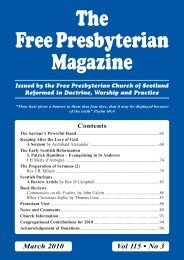December - the Free Presbyterian church of Scotland
December - the Free Presbyterian church of Scotland
December - the Free Presbyterian church of Scotland
- No tags were found...
Create successful ePaper yourself
Turn your PDF publications into a flip-book with our unique Google optimized e-Paper software.
Sanctification in Romans 7 369Sanctification in Romans 7 1Charles Hodge1. Paul details his own experience in Romans 7:7-25. This is one <strong>of</strong> <strong>the</strong>classic passages <strong>of</strong> <strong>the</strong> New Testament on <strong>the</strong> nature <strong>of</strong> sanctification. In allages Augustinians have interpreted it as saying that <strong>the</strong> Apostle is detailinghis own experience. It is enough to say here that <strong>the</strong> burden <strong>of</strong> pro<strong>of</strong> rests onthose who take <strong>the</strong> opposite view <strong>of</strong> <strong>the</strong> passage. It must require very strongpro<strong>of</strong> that <strong>the</strong> Apostle is not speaking <strong>of</strong> himself and giving his own experienceas a Christian, when:(1.) His object in <strong>the</strong> whole discussion throughout <strong>the</strong> sixth and seventhchapters is to prove that <strong>the</strong> law, as it cannot justify, nei<strong>the</strong>r can it sanctify;as it cannot deliver from <strong>the</strong> guilt <strong>of</strong> sin, so nei<strong>the</strong>r can it free us from sin’spower. This is not <strong>the</strong> fault <strong>of</strong> <strong>the</strong> law, for it is spiritual, holy, just and good.It commends itself to <strong>the</strong> reason and <strong>the</strong> conscience as being just what itought to be, requiring nei<strong>the</strong>r more nor less than what it is right to demandand threatening no penalty except what is justly merited by a lack <strong>of</strong> conformityto its requirements.What is <strong>the</strong> effect <strong>of</strong> presenting <strong>the</strong> ideal standard <strong>of</strong> moral perfection towhich we are bound to be conformed on <strong>the</strong> penalty <strong>of</strong> death? The Apostletells us that <strong>the</strong> effects are: (a) A great increase <strong>of</strong> knowledge. He had notknown lust if <strong>the</strong> law had not said, Thou shalt not covet. (b) A sense <strong>of</strong> moralpollution and, consequently, <strong>of</strong> shame and self-loathing. (c) A sense <strong>of</strong> guilt,or <strong>of</strong> just exposure to <strong>the</strong> penalty <strong>of</strong> <strong>the</strong> law, <strong>of</strong> which our whole lives area continued transgression. (d) A sense <strong>of</strong> utter helplessness. The standard,although holy, just and good, is too high for us to meet. We know we nevercan, <strong>of</strong> ourselves, conform to it; nei<strong>the</strong>r can we make satisfaction for pasttransgression. (e) The result <strong>of</strong> all this is despair. The law kills. It destroysnot only all self-complacency, but all hope <strong>of</strong> ever being able to effect ourown salvation. (f) Thus it leads <strong>the</strong> sinner to look away from himself forsalvation – that is, for deliverance from <strong>the</strong> power <strong>of</strong> sin, as well as its guilt.The law is a schoolmaster to lead us to Christ.Why could <strong>the</strong> Apostle say all this about himself? There is nothing hereinconsistent with <strong>the</strong> character or experience <strong>of</strong> a true believer. It is as true<strong>of</strong> <strong>the</strong> Christian as <strong>of</strong> <strong>the</strong> unrenewed sinner that he is not sanctified by moralpersuasion, by <strong>the</strong> objective presentation <strong>of</strong> truth, that he is not regeneratedby any such outward influences. It is <strong>the</strong>refore perfectly pertinent to <strong>the</strong>Apostle’s object to detail his own experience that sanctification could not beeffected by <strong>the</strong> law.1 An edited extract from Hodge’s Systematic Theology, vol 3.
















